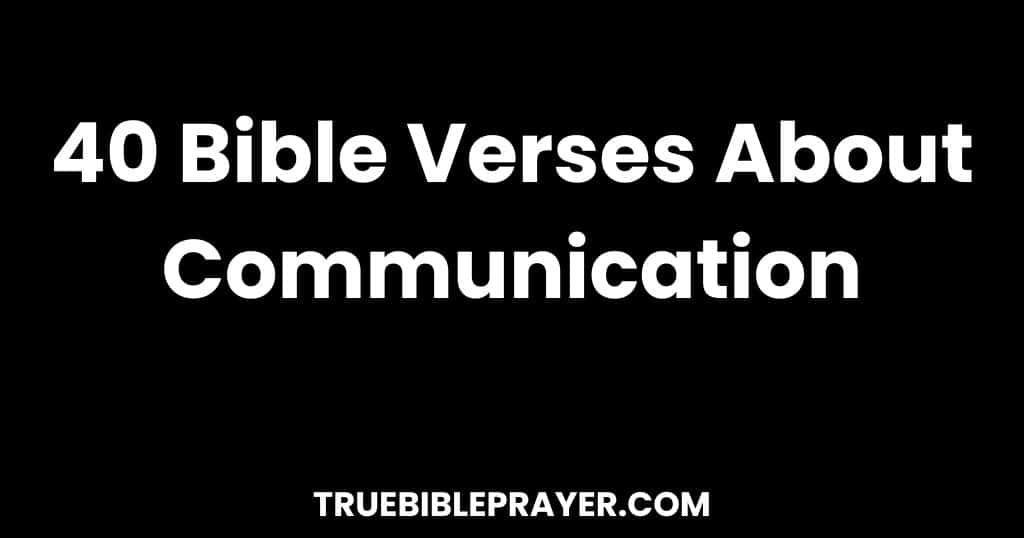Communication can feel frustrating when you try to express yourself but feel unheard or misunderstood. You may want to build stronger connections, but the words come out wrong or not at all. I understand that struggle. Many people carry silent tension in relationships because they never learned how to speak truth with grace or listen with care. In my experience, real communication is not just about what you say but how you live it. The Bible speaks directly to this need, offering timeless wisdom for anyone who wants to speak more clearly, listen more fully, and connect more deeply.
This article shares forty powerful Scriptures that guide how to speak with wisdom, listen with care, and build healthy relationships. Each verse comes with simple insight to help you grow in how you connect, respond, and communicate with others.
Speaking with Wisdom and Grace
Proverbs 15:23
“A person finds joy in giving an apt reply— and how good is a timely word!”
Description: This verse highlights the power of speaking the right word at the right time.
Interpretation: Wise communication brings joy to both the speaker and the listener. When our words are thoughtful and timely, they have the ability to uplift and encourage. This is a call to be intentional and sensitive in how we respond to others.
Ephesians 4:29
“Do not let any unwholesome talk come out of your mouths, but only what is helpful for building others up according to their needs, that it may benefit those who listen.”
Description: Paul emphasizes that our speech should serve a purpose—edification.
Interpretation: Communication should be constructive, not destructive. Speaking to build up others requires empathy, discernment, and love. This verse is a direct instruction for anyone who wants their words to reflect God’s character.
Colossians 4:6
“Let your speech always be gracious, seasoned with salt, so that you may know how you ought to answer each person.”
Description: This verse compares speech to food—something that should be flavorful, not bland or bitter.
Interpretation: Grace-filled words make communication effective and appealing. It is not just about what we say, but how we say it. Responding to others with wisdom and grace helps us build bridges rather than barriers.
Proverbs 16:24
“Gracious words are a honeycomb, sweet to the soul and healing to the bones.”
Description: Solomon compares gracious words to honey—both sweet and healing.
Interpretation: Words have the power to heal emotional wounds. When we speak with kindness, our communication becomes a source of comfort and strength to those who hear us.
Proverbs 25:11
“A word fitly spoken is like apples of gold in a setting of silver.”
Description: A beautifully crafted image of valuable and well-timed speech.
Interpretation: Thoughtful words are precious. The verse teaches us that saying the right thing at the right time is not just wise—it is deeply valuable and impactful.
Ecclesiastes 10:12
“Words from the mouth of the wise are gracious, but fools are consumed by their own lips.”
Description: This contrasts wise speech with foolish speech.
Interpretation: Wisdom expresses itself through grace in communication. A foolish person often speaks recklessly, leading to their own downfall. This reminds us that words reveal the condition of the heart.
Proverbs 12:18
“There is one whose rash words are like sword thrusts, but the tongue of the wise brings healing.”
Description: This proverb makes a sharp distinction between harmful and helpful speech.
Interpretation: Rash words cut deep, while wise communication restores. This verse challenges us to measure our words and speak with intention, especially during conflict or emotional conversations.
Proverbs 13:3
“Those who guard their lips preserve their lives, but those who speak rashly will come to ruin.”
Description: Self-control in speech is directly connected to safety and wisdom.
Interpretation: The ability to pause and filter our words is a protective measure. This verse teaches that controlling our speech is not just polite—it is essential for healthy relationships and peace of mind.
Psalm 19:14
“Let the words of my mouth and the meditation of my heart be acceptable in your sight, O Lord, my rock and my redeemer.”
Description: A prayer asking God to bless and purify both speech and thought.
Interpretation: Communication begins in the heart. This verse encourages us to align our words with God’s will, making every conversation an opportunity to reflect His truth and character.
Matthew 12:36
“But I tell you that everyone will have to give account on the day of judgment for every empty word they have spoken.”
Description: Jesus gives a sobering reminder about the weight of our words.
Interpretation: Words are not empty—they matter deeply to God. This verse calls us to take our communication seriously, knowing that every careless or idle word has eternal significance.
Listening with Understanding
James 1:19
“Everyone should be quick to listen, slow to speak and slow to become angry.”
Description: James offers a simple yet powerful order for healthy communication.
Interpretation: Effective communication begins with active listening. When we rush to speak or react in anger, we close the door to understanding. This verse invites us to pause, hear, and respond with calm wisdom.
Proverbs 18:13
“To answer before listening— that is folly and shame.”
Description: This verse calls out the danger of responding too quickly.
Interpretation: Listening is not just about being polite—it is about showing respect. Speaking without hearing shows arrogance. True communication requires patience to hear fully before forming a response.
Proverbs 1:5
“Let the wise hear and increase in learning, and the one who understands obtain guidance.”
Description: Wisdom grows through listening.
Interpretation: A person who listens carefully becomes wiser over time. Communication is not just for speaking our minds—it is for receiving guidance and learning from others, especially when we do not have all the answers.
Proverbs 19:20
“Listen to advice and accept discipline, and at the end you will be counted among the wise.”
Description: Wisdom comes from listening, especially in correction.
Interpretation: It takes humility to receive advice and correction. When we truly listen, even in hard moments, we grow in character and deepen our understanding of others and ourselves.
Ecclesiastes 5:1
“Guard your steps when you go to the house of God. Go near to listen rather than to offer the sacrifice of fools, who do not know that they do wrong.”
Description: Listening is greater than outward performance.
Interpretation: Sometimes we rush to speak or perform religious acts, forgetting that God values a listening heart. This applies to everyday conversations too—true understanding begins with quiet attention.
Luke 8:18
“Take care then how you hear, for to the one who has, more will be given, and from the one who has not, even what he thinks that he has will be taken away.”
Description: Jesus teaches the importance of attentive, responsive listening.
Interpretation: How we hear matters. When we listen with intention and a heart ready to apply truth, we grow. But if we ignore what we hear, we risk losing even the insight we already hold.
Proverbs 15:31
“Whoever heeds life-giving correction will be at home among the wise.”
Description: A teachable spirit leads to wisdom.
Interpretation: Communication often includes feedback. Those who welcome correction instead of resisting it become part of a wiser community. Listening in humility opens the door to deeper relationships and stronger character.
Proverbs 21:28
“A false witness will perish, but the word of a man who hears will endure.”
Description: Truth is rooted in careful listening.
Interpretation: Those who truly hear—not just physically but with understanding—build lasting influence. This verse affirms that communication built on listening stands stronger than loud or careless speech.
Job 13:5
“If only you would be altogether silent! For you, that would be wisdom.”
Description: Job calls out empty and unhelpful words from his friends.
Interpretation: Sometimes silence is the wisest contribution to a conversation. Speaking without insight can cause harm, but silence can create space for comfort, clarity, or healing.
Matthew 11:15
“He who has ears to hear, let him hear.”
Description: A repeated phrase in Jesus’ teaching—an invitation to truly listen.
Interpretation: Hearing goes beyond sound. This is a call to pay attention, understand, and apply what is heard. In communication, this means listening with the intent to connect, not just to reply.
Avoiding Harmful Words
Proverbs 10:19
“Sin is not ended by multiplying words, but the prudent hold their tongues.”
Description: More words do not always mean better communication.
Interpretation: Talking too much increases the risk of sin. Wisdom often shows in restraint. Knowing when to be silent is just as important as knowing what to say.
Proverbs 11:9
“With his mouth the godless man would destroy his neighbor, but by knowledge the righteous are delivered.”
Description: Words can be tools of destruction or protection.
Interpretation: Gossip, lies, or careless talk can deeply wound others. Righteous communication brings clarity, healing, and rescue from harm. We must be mindful of how our words affect those around us.
Psalm 34:13
“Keep your tongue from evil and your lips from telling lies.”
Description: A direct command about the moral responsibility of our speech.
Interpretation: Honesty is foundational in communication. Lying and verbal evil corrupt not just others but our own character. Speaking with integrity honors both God and others.
Proverbs 26:20
“Without wood a fire goes out; without a gossip a quarrel dies down.”
Description: Gossip fuels conflict.
Interpretation: Harmful communication often hides behind casual or “harmless” talk. Gossip stirs up strife and tension. Choosing to stay silent about others can stop conflict before it begins.
Ephesians 5:4
“Let there be no filthiness nor foolish talk nor crude joking, which are out of place, but instead let there be thanksgiving.”
Description: Paul warns against careless and inappropriate speech.
Interpretation: Crude or disrespectful language cheapens communication. This verse reminds us that wholesome speech reflects gratitude and purity. Our words should honor the listener and glorify God.
James 3:6
“The tongue also is a fire, a world of evil among the parts of the body. It corrupts the whole body, sets the whole course of one’s life on fire, and is itself set on fire by hell.”
Description: A graphic image of the destructive power of words.
Interpretation: This verse offers a strong warning. Our words can destroy reputations, relationships, and even our own future. Spiritual maturity includes learning to tame the tongue.
Proverbs 17:27
“Whoever restrains his words has knowledge, and he who has a cool spirit is a man of understanding.”
Description: Self-control in speech reflects wisdom.
Interpretation: Wise people choose their words carefully and speak calmly. This kind of communication invites trust, reduces tension, and brings clarity even in conflict.
Proverbs 18:21
“The tongue has the power of life and death, and those who love it will eat its fruit.”
Description: Words shape reality.
Interpretation: What we say can either give life or bring destruction. The effects of our words ripple out. If we value communication, we must respect its power and use it to bring healing, not harm.
Titus 3:2
“To speak evil of no one, to avoid quarreling, to be gentle, and to show perfect courtesy toward all people.”
Description: A New Testament call to gracious speech.
Interpretation: Healthy communication means avoiding slander and unnecessary argument. Gentleness and courtesy are not weakness—they are powerful ways to reflect Christ in every conversation.
James 1:26
“Those who consider themselves religious and yet do not keep a tight rein on their tongues deceive themselves, and their religion is worthless.”
Description: Our words reflect the authenticity of our faith.
Interpretation: Speaking without control undermines even the most sincere beliefs. This verse confronts the disconnect between claiming to follow God and failing to guard our words. True faith shapes how we speak.
Communicating in Truth and Love
Ephesians 4:15
“Instead, speaking the truth in love, we will grow to become in every respect the mature body of him who is the head, that is, Christ.”
Description: Truth and love are inseparable in Christian communication.
Interpretation: Speaking truth without love can be harsh. Speaking love without truth can be shallow. This verse teaches us to do both — be honest, but always with compassion and care for the other person.
Zechariah 8:16
“These are the things you are to do: Speak the truth to each other, and render true and sound judgment in your courts.”
Description: God commands honesty as a mark of righteous living.
Interpretation: Truth builds trust. In every relationship and community, honest speech forms the foundation of justice and peace. When we speak truthfully, we reflect God’s own character.
Proverbs 27:6
“Wounds from a friend can be trusted, but an enemy multiplies kisses.”
Description: Honest correction from a friend may hurt, but it is valuable.
Interpretation: Real communication is not always easy. Sometimes love means saying hard things. True friends speak with honesty, even when it is uncomfortable — because they care about your growth.
1 John 3:18
“Dear children, let us not love with words or speech but with actions and in truth.”
Description: Love must go beyond talk — it must show in what we do.
Interpretation: This verse challenges shallow or performative communication. Real love communicates through honesty and follow-through. Words mean little without action that supports them.
Proverbs 24:26
“An honest answer is like a kiss on the lips.”
Description: Truthful responses are both respectful and intimate.
Interpretation: Giving someone an honest answer — even if it is not what they want to hear — shows deep care and respect. This verse affirms that truth told with grace is a sign of genuine relationship.
1 Peter 3:15
“But in your hearts revere Christ as Lord. Always be prepared to give an answer to everyone who asks you to give the reason for the hope that you have. But do this with gentleness and respect.”
Description: Communicating truth must include respect and humility.
Interpretation: When we explain our faith or express our beliefs, tone matters. Gentleness does not weaken the message — it strengthens it. This verse sets a standard for grace-filled communication in hard conversations.
Proverbs 15:1
“A gentle answer turns away wrath, but a harsh word stirs up anger.”
Description: The tone of your words can change the entire outcome.
Interpretation: Even in conflict, a soft answer can defuse tension. Harshness inflames, but gentleness calms. Communication that brings peace often starts with choosing a gentle tone.
Romans 12:18
“If it is possible, as far as it depends on you, live at peace with everyone.”
Description: Personal responsibility in how we speak and relate to others.
Interpretation: We cannot control how others communicate, but we are responsible for our part. This verse reminds us to pursue peace, especially in how we speak. Our words can either build bridges or burn them.
Galatians 6:1
“Brothers and sisters, if someone is caught in a sin, you who live by the Spirit should restore that person gently. But watch yourselves, or you also may be tempted.”
Description: Even correction must be handled with care.
Interpretation: Honest conversations about sin or failure are never easy. But when done gently and humbly, they can lead to restoration. This verse reminds us that love corrects — but never condemns.
Hebrews 10:24–25
“And let us consider how we may spur one another on toward love and good deeds, not giving up meeting together, as some are in the habit of doing, but encouraging one another—and all the more as you see the Day approaching.”
Description: Communication should be used to uplift and inspire.
Interpretation: One of the greatest purposes of speech is encouragement. This verse calls us to use our words to build one another up and to stay connected in faith and fellowship.
Conculison
Communication shapes every part of life — in families, friendships, churches, and even in quiet moments with God. These forty Bible verses do more than offer advice. They reveal a deeper way of speaking, listening, and understanding that leads to peace, truth, and connection.
Whether your struggle has been with speaking too quickly, listening too little, or trying to bring love into hard conversations, these Scriptures point the way. The wisdom is simple, but it calls for real change. Learning to speak with grace, to listen with care, and to correct with gentleness can heal more than we realize.




